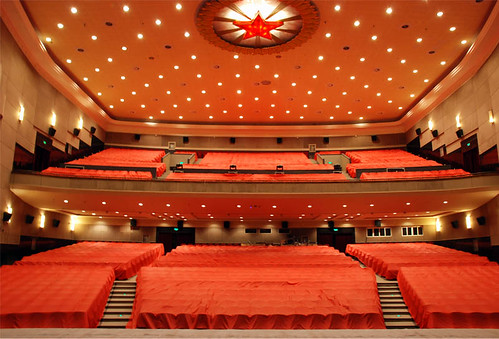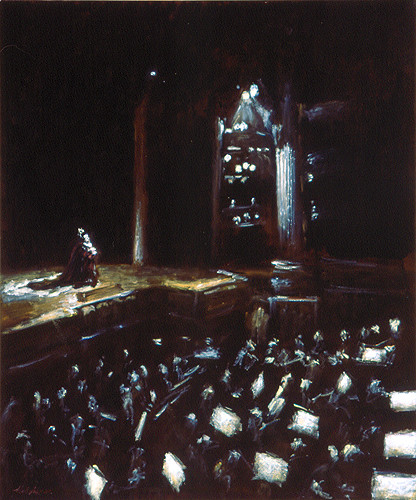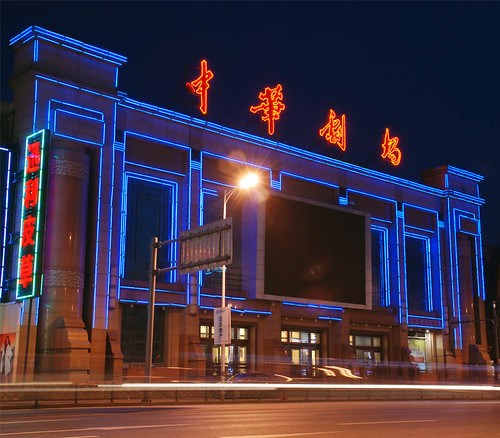My list, in alphabetically order, is below:
- Honoré de Balzac
- Yǔ Cáo (Chinese playwright)
- Anton Chekhov
- Jean Cocteau
- Fyodor Dostoevsky
- Friedrich Dürrenmatt
- Euripides
- Carlo Goldoni
- Henrik Ibsen
- Aleksandr Pushkin
- Rainer Maria Rilke
- Jean-Paul Sartre
- Friedrich von Schiller
- W. G. Sebald
- William Shakespeare
My home city, Shenyang, has been an industry center for more than a century. It is the capital city of Liaoning Province, one of the three Manchurian provinces in northeast China. At one time, one third of the national products were produced in Liaoning Province alone, before its decline like the rust-belt in the US and its rebirth as a IT, commerce, finance and transportation center, though with a much reduced national importance.
In my previous entry, Growing Up In Cultural Desert, I mentioned a prestigious troupe lost their theater to a discotheque. It was a sad event for a few otherwise largely unnoticed. Fortunately, the troupe didn't disband and continued to play in other theaters, and later moved to another permanent home.
It was through this very troupe, Liaoning People's Art Theater, I had my first live Shakespeare experience. In 1986, when China staged the first Shakespeare Festival in Beijing and Shanghai, this theater participated with its first production of King Lear starring Li Moran, who had been a national icon due to his 1962 film performance of a tragic naval hero in Naval Battle of 1894, as King Lear. Their performance was met with great acclaim in Beijing and returned to further perform for Shenyang audience under the commandment of Cultural Ministry, second ever such command performance in the People's Republic of China.
In 1950s, they had attempted to stage this play but aborted the effort. The theater was steeped in Stanislavski's system and their adherence to this method proved too cumbersome for such gargantuan play. Only after many modern theater experiments flourished in 1980s in China, the theater was able to come back to King Lear with a new approach and struck the right balance between verisimilitude and stylization.
 It was a devastating performance and I still remember vividly how Mr. Li's resonant deep bass rolled out like thunder in the theater and how his giant body bent down like broken doll. Though the costumes were traditional, the staging was modern, succinct and fluid. Other successful elements were the sets and the lighting. There was no curtain, a novelty in China at the time. Dominating the stage, floor to ceiling, was a giant sculpture of a crown, formed with massive beams, which slowly disintegrate with the progression of the play and matched the psychology of the characters perfectly, and also provided locales such as castles, forests, and ruins at various stages. Near the very end of the play, the heartbroken Lear, and fell on the body of murdered Cordelia, who was wrapped up in a white gown, which merged with Lear's white mane and became the focal point of the stage and through absolute stillness they conveyed an unbearable sadness and resignation. Then the bier they rested upon started to roll upstage in a solemn and endlessly long procession, inching towards the unlit rear area of the stage whose enormous depth astonished me. Her white gown and his white mane became dimmer and dimmer and eventually was swallowed up by complete darkness.
It was a devastating performance and I still remember vividly how Mr. Li's resonant deep bass rolled out like thunder in the theater and how his giant body bent down like broken doll. Though the costumes were traditional, the staging was modern, succinct and fluid. Other successful elements were the sets and the lighting. There was no curtain, a novelty in China at the time. Dominating the stage, floor to ceiling, was a giant sculpture of a crown, formed with massive beams, which slowly disintegrate with the progression of the play and matched the psychology of the characters perfectly, and also provided locales such as castles, forests, and ruins at various stages. Near the very end of the play, the heartbroken Lear, and fell on the body of murdered Cordelia, who was wrapped up in a white gown, which merged with Lear's white mane and became the focal point of the stage and through absolute stillness they conveyed an unbearable sadness and resignation. Then the bier they rested upon started to roll upstage in a solemn and endlessly long procession, inching towards the unlit rear area of the stage whose enormous depth astonished me. Her white gown and his white mane became dimmer and dimmer and eventually was swallowed up by complete darkness.Before watching this seminal performance, I also saw many televised performances of that Shakespeare festivals from Beijing and Shanghai, including Othello, Antony and Cleopatra, A Midsummer Night's Dream, Taming the Shrew, etc. Some were good, some were insufferably bad, particularly those free adaptations, which managed to lose the gravity and resonance of true Shakespearean plays without gaining much through their "immediate appeals to local audiences". Those performances seemed to me somewhat gimmicky. Most novelties of that festival were the adaptations into folk operas, including but not limited to Peking Opera -- almost every region has its own version of folk opera, some more lyrical and some more declamatory. Most of those free adaptations moved the time and locales to China, à la Kurosawa, which seems utterly superfluous, because the humanity within Shakespearean plays, if not the English verses, were truly universal.
The crowning production of that festival definitely was that King Lear by my home troupe and I will always treasure that memory, full of dramatic truth and emotional honesty from that much exulted large cast.

Limelight © Matthew Felix Sun
>> My Path, Part IV: My First Devastation and Cynicism
<< My Path, Part II: Growing Up in Cultural Desert






No comments:
Post a Comment